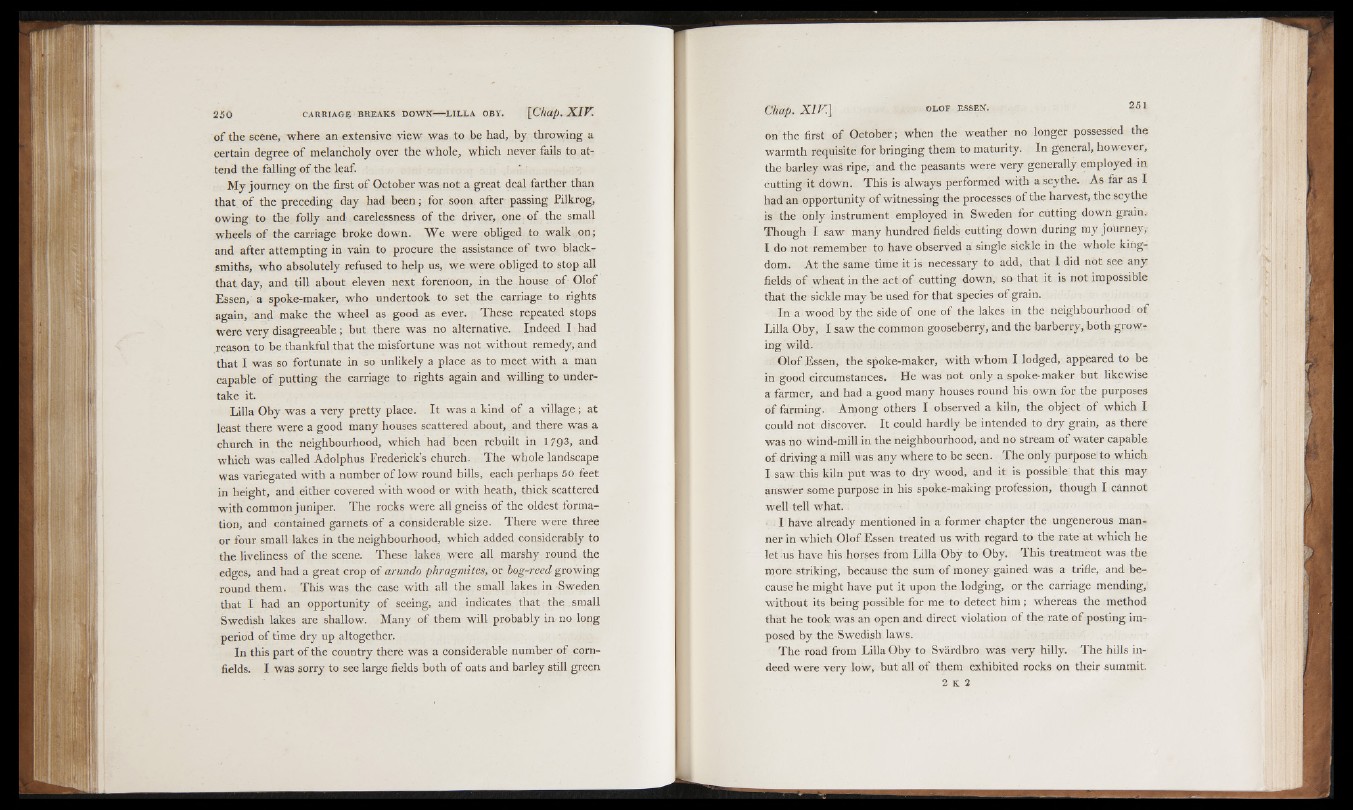
of the scene, where an extensive view was to be had, by throwing a
certain degree o f melancholy over the whole, which never fails to attend
the falling o f the leaf.
My journey on the first of October was not a great deal farther than
that of the preceding day had been; for soon after passing Pilkrog,
owing to the folly and carelessness of the driver, one of the small
wheels o f the carriage broke down. W e were obliged to walk on;
and after attempting in vain to procure the assistance of two blacksmiths,
who absolutely refused to help us, we were obliged to stop all
that day, and till about eleven next forenoon, in the house of Olof
Essen, a spoke-maker, who undertook to set the carriage to rights
again, and make the wheel as good as ever. These repeated stops
were very disagreeable; but there was no alternative. Indeed I had
reason to be thankful that the misfortune was not without remedy, and
that I was so fortunate in so unlikely a place as to meet with a man
capable of putting the carriage to rights again and willing to undertake
it.
Lilia Oby was a very pretty place. It was a kind of a village; at
least there were a good many houses scattered about, and there was a
church in the neighbourhood, which had been rebuilt in 17 93» and
which was called Adolphus Frederick’s church. The whole landscape
was variegated with a number of low round hills, each perhaps 50 feet
in height, and either covered with wood or with heath, thick scattered
with common juniper. The rocks were all gneiss of the oldest formation,
and contained garnets of a considerable size. There were three
or four small lakes in the neighbourhood, which added considerably to
the liveliness of the scene. These lakes were all marshy round the
edges, and had a great crop of arundo phragmites, or bog-reed growing
round them. This was the case with all the small lakes in Sweden
that I had an opportunity o f seeing, and indicates that the small
Swedish lakes are shallow. Many of them will probably in no long
period of time dry up altogether.
In this part of the country there was a considerable number of cornfields.
I was sorry to see large fields both of oats and barley still green
on the first of October; when the weather no longer possessed the
warmth requisite for bringing them to maturity. In general, however,
the barley was ripe, and the peasants were very generally employed in
cutting it down. This is always performed with a scythe. As far as I
had an opportunity o f witnessing the processes of the harvest, the scythe
is the only instrument employed in Sweden for cutting down grain.
Though I saw many hundred fields cutting down during my journey,
I do not remember to have observed a single sickle in the whole kingdom.
At the same time it is necessary to add, that I did not see any
fields o f wheat in the act of cutting down, so that it is not impossible
that the sickle may be used for that species o f grain.
In a wood by the side of one o f the lakes in the neighbourhood of
Lilia Oby, I saw the common gooseberry, and the barberry, both growing
wild.
Olof Essen, the spoke-maker, with whom I lodged, appeared to he
in good circumstances. He was not only a spoke-maker but likewise
a farmer, and had a good many houses round his own for the purposes
of farming. Among others I observed a kiln, the object of which I
could not discover. It could hardly be intended to dry grain, as there
was no wind-mill in the neighbourhood, and no stream o f water capable
of driving a mill was any where to be seen. The only purpose to which
I saw this kiln put was to dry wood, and it is possible that this may
answer some purpose in his spoke-making profession, though I cannot
well tell what.
• > I have already mentioned in a former chapter the ungenerous manner
in which Olof Essen treated us with regard to the rate at which he
let us have his horses from Lilia Oby to Oby. This treatment was the
more striking, because the sum of money gained was a trifle, and because
he might have put it upon the lodging, or the carriage mending,
without its being possible for me to detect him ; whereas the method
that he took was an open and direct violation o f the rate o f posting imposed
by the Swedish laws.
The road from Lilia Oby to Svardbro was very hilly. The hills indeed
were very low, but all of them exhibited rocks on their summit.
2 k 2